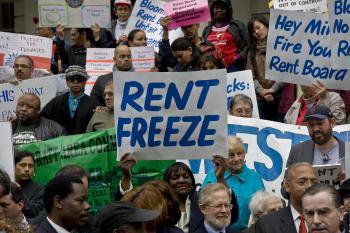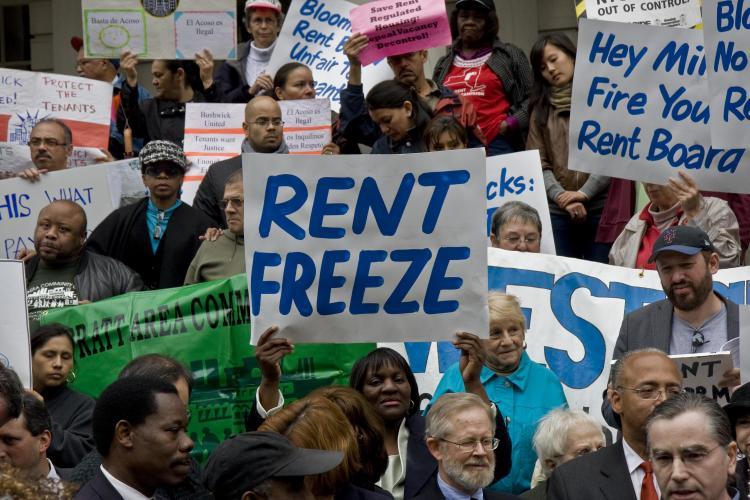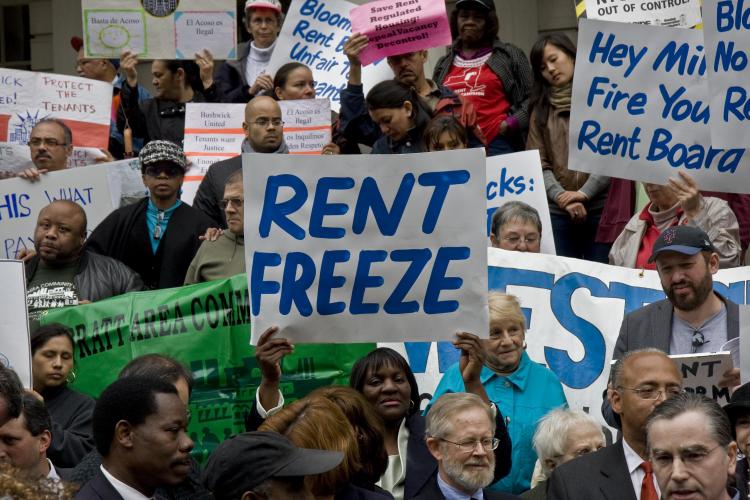NEW YORK—Tougher times are on their way for tenants living in rent-stabilized apartment units in New York, with new rent hikes starting Oct. 1.
The New York City Rent Guidelines Board decided last June to allow a 3 percent rent increase on one-year leases or a 6 percent increase on two-year leases coming up for renewal this year.
Tenants and officials gathered in front of City Hall on Thursday, to protest the rent hike, which they say will burden the city’s most vulnerable households.
“Why does my landlord still get a raise when many of my neighbors are unemployed?” asked Hector Rivera, a tenant and community organizer from Brooklyn, in a press statement.
“It is time to give tenants a little bit of a break,” said Assemblyman Richard Gottfried, referring to the current economic crisis.
“They spend more on rent than food, gasoline, than anything,” he said.
What the protesters want is clear: a freeze on rent increases to make it possible for the lowest income households to continue living in New York.
Council Member David Weprin said that he understands times are tough right now. “New York is hurting, everyone is suffering … We can’t afford to live here anymore … That’s why we need a rent freeze now,” said Council Member David Weprin.
Council Speaker Christine Quinn said that this scene on Oct. 1 is deja vu. “You can predict the outcome before it happens, rents going up year after year after year,” she said.
Living in a New York apartment since 1975, senior Emely Margolis, came to the steps of City Hall to express her frustration over the new hike.
“I’m living in a rent-stabilized apartment, where the rent goes up and up and up.”
Even a 4 to 8 percent rent increase is a big jump for people like her she said. “I mean people are now paying 80 or 100 dollar increases.”
“New York is becoming a city only for wealthy people,” she said.
Landlords in New York are accused of using a variety of methods to get their low rent-paying tenants to move out, so they can increase rents to more ‘normal’ New York levels.
One method described by Margolis is called “vacancy decontrol.” According to her, this refers to a landlord who puts in improvements, in order to justify an increase resulting in rents too high for the low-income renter to afford. When the renter moves out, the landlord can increase the rental price even more.
Another tactic is landlords harassing tenants until the situation becomes untenable and they move out.
However, the landlord lobby filed a lawsuit to try to stop the act, calling it vague and unnecessary, according to Council Member Quinn.
In August, the State Supreme Court ruled in favor of the city and the Act went into effect.
“The Tenant Protection Act was signed into law because we wanted to give families the power to confront a landlord that was engaging in a pattern of behavior designed to get them out of their homes,” said Quinn in an August press statement.
Previously, Housing Court was only an option for tenants with complaints about the physical condition of their unit or the landlord’s failure to provide essential services.
The New York City Rent Guidelines Board decided last June to allow a 3 percent rent increase on one-year leases or a 6 percent increase on two-year leases coming up for renewal this year.
Tenants and officials gathered in front of City Hall on Thursday, to protest the rent hike, which they say will burden the city’s most vulnerable households.
“Why does my landlord still get a raise when many of my neighbors are unemployed?” asked Hector Rivera, a tenant and community organizer from Brooklyn, in a press statement.
“It is time to give tenants a little bit of a break,” said Assemblyman Richard Gottfried, referring to the current economic crisis.
“They spend more on rent than food, gasoline, than anything,” he said.
What the protesters want is clear: a freeze on rent increases to make it possible for the lowest income households to continue living in New York.
Council Member David Weprin said that he understands times are tough right now. “New York is hurting, everyone is suffering … We can’t afford to live here anymore … That’s why we need a rent freeze now,” said Council Member David Weprin.
Council Speaker Christine Quinn said that this scene on Oct. 1 is deja vu. “You can predict the outcome before it happens, rents going up year after year after year,” she said.
Living in a New York apartment since 1975, senior Emely Margolis, came to the steps of City Hall to express her frustration over the new hike.
“I’m living in a rent-stabilized apartment, where the rent goes up and up and up.”
Even a 4 to 8 percent rent increase is a big jump for people like her she said. “I mean people are now paying 80 or 100 dollar increases.”
“New York is becoming a city only for wealthy people,” she said.
Landlords in New York are accused of using a variety of methods to get their low rent-paying tenants to move out, so they can increase rents to more ‘normal’ New York levels.
One method described by Margolis is called “vacancy decontrol.” According to her, this refers to a landlord who puts in improvements, in order to justify an increase resulting in rents too high for the low-income renter to afford. When the renter moves out, the landlord can increase the rental price even more.
Another tactic is landlords harassing tenants until the situation becomes untenable and they move out.
Tenant Protection Act
This issue became so acute that in March 2008, City Hall passed the Tenant Protection Act giving tenants the right to take landlords to Housing Court for harassment.
In August this year, Quinn applauded a State Supreme Court decision to uphold the Tenant Protection Act, which makes it possible for tenants to take a landlord to court for harassment.However, the landlord lobby filed a lawsuit to try to stop the act, calling it vague and unnecessary, according to Council Member Quinn.
In August, the State Supreme Court ruled in favor of the city and the Act went into effect.
“The Tenant Protection Act was signed into law because we wanted to give families the power to confront a landlord that was engaging in a pattern of behavior designed to get them out of their homes,” said Quinn in an August press statement.
Previously, Housing Court was only an option for tenants with complaints about the physical condition of their unit or the landlord’s failure to provide essential services.







Friends Read Free